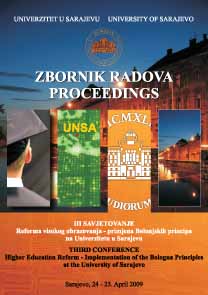Dileme i sporovi oko sticanja kompetencija za nastavni rad
Dilemmas and Disputes Related to Acquiring Competences for Teaching
Author(s): Mujo SlatinaSubject(s): Social Sciences
Published by: Univerzitet u Sarajevu
Summary/Abstract: Inclusion of different study programs into the Bologna process results in several dilemmas, arguments and problems. This is evident in all the segments of education. Adoption of the 3+2 and/or 4+1 formula cannot resolve all dilemmas the Bologna process brings. This is especially evident in the field of education of future teachers. Competences for teaching are still understood through the logic of “teaching material” and through the logic of the term “skill of the skill”, rather then through the logic “teaching skill”. Scientific side of the teachers’ professional development appears as the necessary and sufficient condition of successful teaching/learning/ studying. Although the teaching profession participates in the “production” of all other professions, it is treated, according to the traditional academic opinion, as a semi-profession. That is why the author emphasizes the danger of unfoundedly equating the two terms – “skill of the skill” and “teaching skill”, as well as the danger of equating two different professions (for example, designer and design instructor are two different professions). That is why acquiring competences in the teaching profession needs to rest upon the two inseparable educational components: subject study and educational study. In the process of acquiring the teaching competences, the Bologna reform asks for development of a special identity “education for education”. It seeks achievement of certain academic standards and it seeks changes in both conceptual, organizational and module domain. On the other hand, the author emphasizes the necessity of adjusting both generic and subject-specific competences to the teaching tasks. Relation between the complexity of the studies and their competences has not been determined yet. The degrees of Bachelor and Masters have not yet been assigned the clear and differentiated outcomes and have not yet been assigned to different levels. We still have not answered the question: to what extent does the higher education qualification of the first degree, with its generic and subject-specific competences, enable the student to enter the labor market? In some cases, the space for acquiring competences is spread at the expense of the first, and in others at the expense of the second degree. Many issues in the process of acquiring professional, the so-called teacher-competences have not been resolved. That is why the author advocates solving of the issue of continuation of studies in the same profession (the second degree – vertical continuation of the studies), solving of the issue of continuation of the studies for the teacher in the second, similar profession after the completion of the first degree (diagonal continuation of the studies), as well as solving of the issue of continuation of the studies with the purpose of acquiring new subject-specific competences (horizontal continuation of the studies).
Journal: Zbornik radova - Univerzitet u Sarajevu
- Issue Year: 2009
- Issue No: 03
- Page Range: 109-126
- Page Count: 18
- Language: Bosnian

